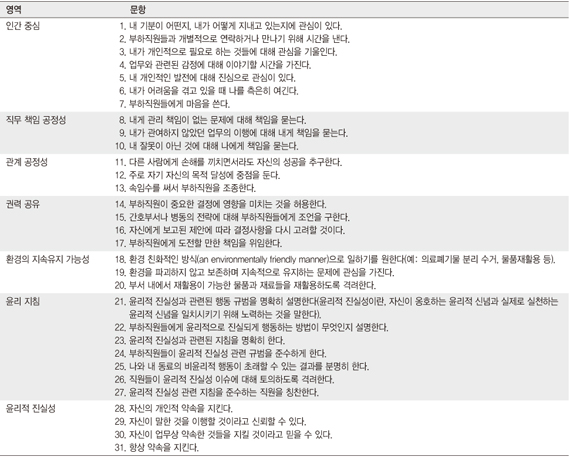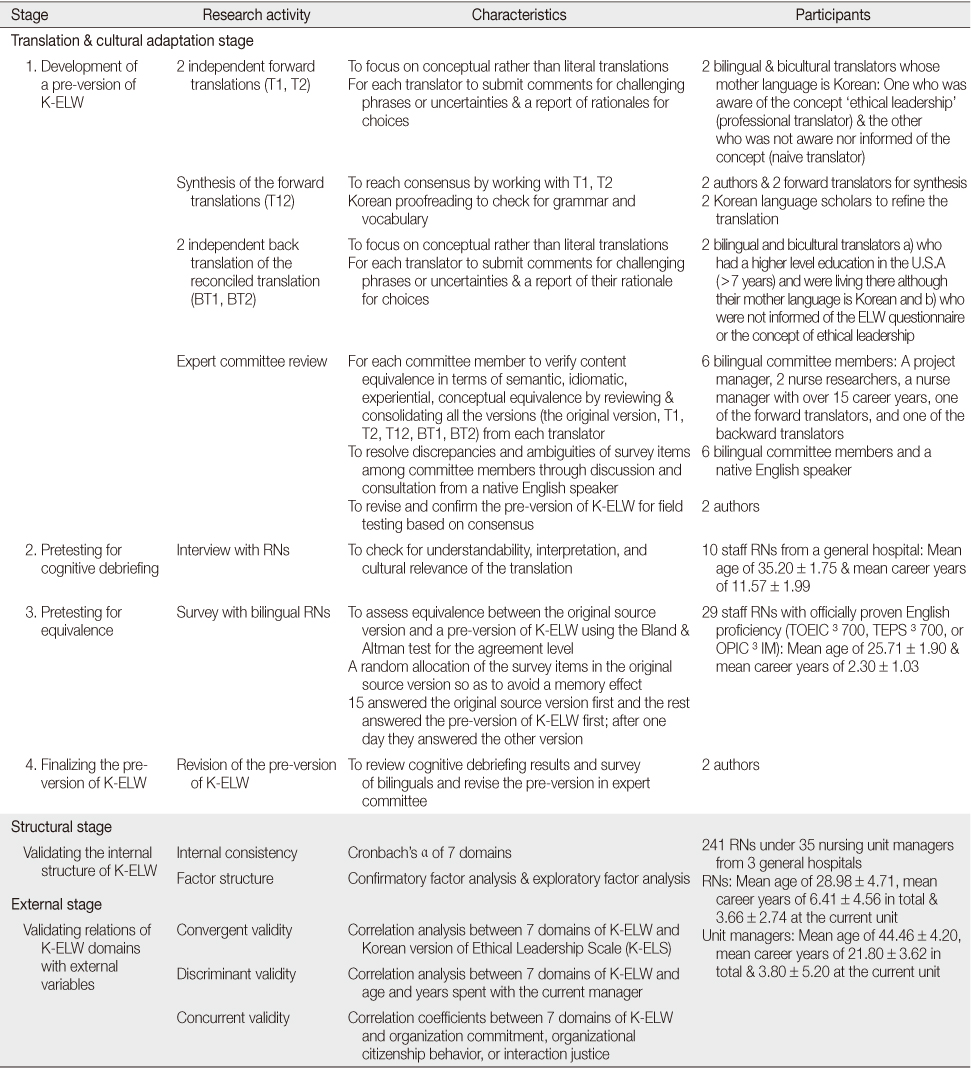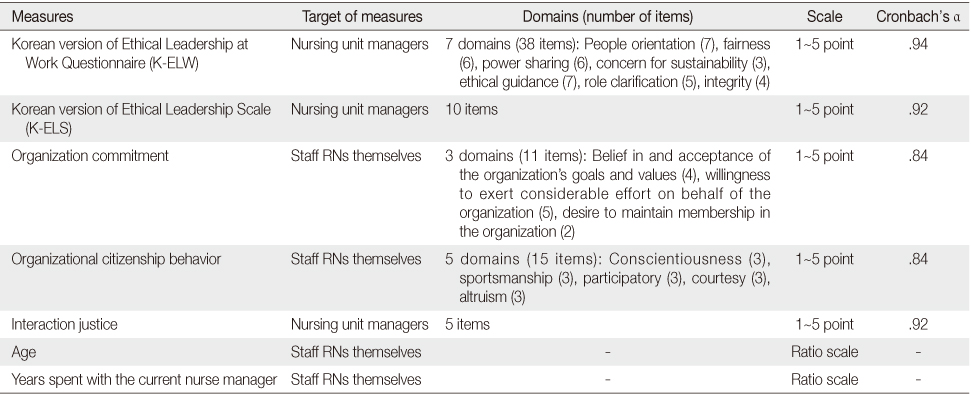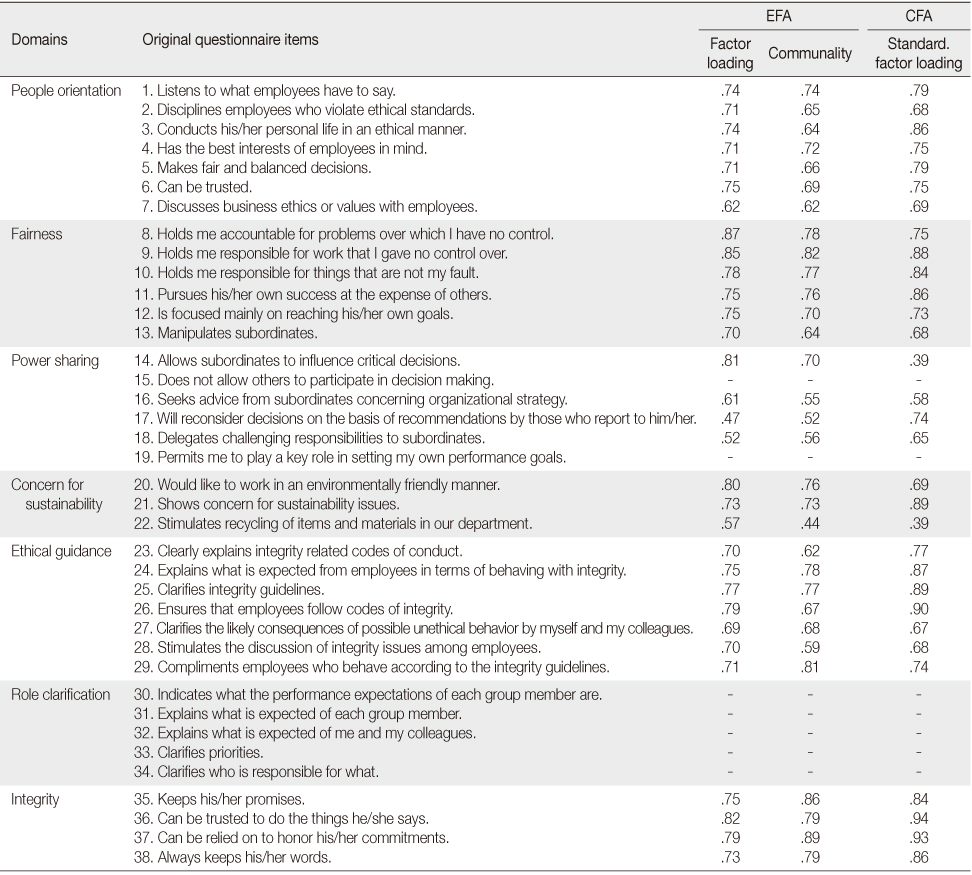Articles
- Page Path
- HOME > J Korean Acad Nurs > Volume 45(2); 2015 > Article
-
Original Article
- A Validation Study of the Modified Korean Version of Ethical Leadership at Work Questionnaire (K-ELW)
- Jeong-Eon Kim, Eun-Jun Park
-
Journal of Korean Academy of Nursing 2015;45(2):240-250.
DOI: https://doi.org/10.4040/jkan.2015.45.2.240
Published online: April 30, 2015
1Graduate School, Konkuk University, Chungju, Korea.
2Department of Nursing, Konkuk University, Chungju, Korea.
- Address reprint requests to: Park, Eun-Jun. Department of Nursing, Konkuk University, 268 Chungwon-daero, Chungju 380-701, Korea. Tel: +82-43-840-3953, Fax: +82-43-840-3958, eunjunp@kku.ac.kr
© 2015 Korean Society of Nursing Science
This is an Open Access article distributed under the terms of the Creative Commons Attribution NoDerivs License. (http://creativecommons.org/licenses/by-nd/4.0/) If the original work is properly cited and retained without any modification or reproduction, it can be used and re-distributed in any format and medium.
Abstract
-
Purpose
- The purpose of this study was to validate the Korean version of the Ethical Leadership at Work questionnaire (K-ELW) that measures RNs' perceived ethical leadership of their nurse managers.
-
Methods
- The strong validation process suggested by Benson (1998), including translation and cultural adaptation stage, structural stage, and external stage, was used. Participants were 241 RNs who reported their perceived ethical leadership using both the pre-version of K-ELW and a previously known Ethical Leadership Scale, and interactional justice of their managers, as well as their own demographics, organizational commitment and organizational citizenship behavior. Data analyses included descriptive statistics, Pearson correlation coefficients, reliability coefficients, exploratory factor analysis, and confirmatory factor analysis. SPSS 19.0 and Amos 18.0 versions were used.
-
Results
- A modified K-ELW was developed from construct validity evidence and included 31 items in 7 domains: People orientation, task responsibility fairness, relationship fairness, power sharing, concern for sustainability, ethical guidance, and integrity. Convergent validity, discriminant validity, and concurrent validity were supported according to the correlation coefficients of the 7 domains with other measures.
-
Conclusion
- The results of this study provide preliminary evidence that the modified K-ELW can be adopted in Korean nursing organizations, and reliable and valid ethical leadership scores can be expected.
- 1. Kalshoven K, Den Hartog DN, De Hoogh AHB. Ethical leadership at work questionnaire (ELW): Development and validation of a multidimensional measure. Leadersh Q. 2011;22(1):51–69. Article
- 2. Brown ME, Trevino LK, Harrison DA. Ethical leadership: A social learning perspective for construct development and testing. Organ Behav Hum Decis Process. 2005;97(2):117–134. Article
- 3. Brown ME, Trevino LK. Ethical leadership: A review and future directions. Leadersh Q. 2006;17(6):595–616. Article
- 4. Kang YS. Research on the mediators effect of organizational commitment between HRM ethics and organizational citizenship behavior. Korea Acad Bus Ethics. 2000;2:171–191.
- 5. Jung HS, Kim MJ, Yoon HH. Effect of the practice for ethics management on the employees' job satisfaction in the foodservice industry. Korea Acad Soc Hotel Admin. 2007;16(1):105–120.
- 6. Lee JS. Nurse managers' ethical leadership, type of organizational culture and organizational performance [master's thesis]. Seoul, Ewha Womans University. 2009.
- 7. Lee KH. Effects of ethical leadership on perceived organizational support and organizational commitment of nurses in a hospital: Mediating role of perceived organizational support. J Korean Acad Nurs Admin. 2010;16(4):419–427. Article
- 8. Yi MS, Son SW, Chang YC. Determinants and outcomes of ethical leadership. Korea J Bus Admin. 2009;22(6):3169–3193.
- 9. Kim BJ. Techniques for cross-cultural translation and validation of questionnaires. Korean J Sport Psychol. 2003;14(1):13–26.
- 10. Yeom HE. Cultural adaptation and the psychometric properties of the Korean version of the symptom management beliefs questionnaire. Asian Nurs Res. 2013;7(3):104–111. Article
- 11. Benson J. Developing a strong program of construct validation: A test anxiety example. Educ Meas. 2005;17(1):10–17. Article
- 12. Oh SH, Kim BJ. New concept of validity for psychological assessment instruments and its usage. Korean J Sport Psychol. 2002;13(3):111–126.
- 13. Beaton DE, Bombardier C, Guillemin F, Ferraz MB. Guidelines for the process of cross-cultural adaptation of self-report measures. Spine. 2000;25(24):3186–3191.ArticlePubMed
- 14. Guillemin F, Bombardier C, Beaton D. Cross-cultural adaptation of health-related quality of life measures: Literature review and proposed guidelines. J Clin Epidemiol. 1993;46(12):1417–1432.ArticlePubMed
- 15. Sousa VD, Rojjanasrirat W. Translation, adaptation and validation of instruments or scales for use in cross-cultural health care research: A clear and user-friendly guideline. J Eval Clin Pract. 2011;17(2):268–274. ArticlePubMed
- 16. Wild D, Grove A, Martin M, Eremenco S, McElroy S, Verjee-Lorenz A, et al. Principles of good practice for the translation and cultural adaptation process for patient-reported outcomes (PRO) measures: Report of the ISPOR task force for translation and cultural adaptation. Value Health. 2005;8(2):94–104. ArticlePubMed
- 17. World Health Organization. Process of translation and adaptation of instruments [Internet]. Geneva, CH, Author. 2013;cited 2013 August 1. Available from: http://www.who.int/substance_abuse/research_tools/translation/en/
- 18. Jung HK, Shim DS, Kim MJ. The effects of leaders' ethical leadership on followers' job performance, organizational commitment and organization citizenship behaviors: The mediating effect of organization-based self-esteem and the moderating effect of corporate ethical values. Korean J Bus Admin. 2013;26(4):801–827.
- 19. Hendriks E. Ethical leadership and moral behavior of employees: The moderating role of interactional justice [master's thesis]. Tilburg, NL, Tilburg University. 2011.
- 20. Hinkin TR. A brief tutorial on the development of measures for use in survey questionnaires. Organ Res Methods. 1998;1(1):104–121. ArticlePDF
- 21. Mowday RT, Steers RM, Porter LW. The measurement of organizational commitment. J Vocat Behav. 1979;14(2):224–247. Article
- 22. Chang KW. A study on structural modeling of organizational citizenship behaviors for nurses [dissertation]. Seoul, Kyung Hee University. 2010.
- 23. Podsakoff PM, MacKenzie SB, Moorman RH, Fetter R. Transformational leader behaviors and their effects on followers' trust in leader, satisfaction, and organizational citizenship behaviors. Leadersh Q. 1990;1(2):107–142. Article
- 24. Min JI. A study on influence of subordinate's justice perception on organizational effectiveness: By using emotional competence of supervisor as a modulating effect [master's thesis]. Jeonju, Chonbuk National University. 2010.
- 25. Bland JM, Altman DG. Statistical methods for assessing agreement between two methods of clinical measurement. Lancet. 1986;1(8476):307–310.ArticlePubMed
- 26. Kang H. A guide on the use of factor analysis in the assessment of construct validity. J Korean Acad Nurs. 2013;43(5):587–594. ArticlePubMed
- 27. Hair JF, Black B, Babin B, Anderson RE, Tatham RL. Multivariate data analysis. 6th ed. Upper Saddle River, NJ: Prentice Hall; 2005.
- 28. Kim DE. AMOS A to Z. Paju: Hakhyunsa; 2008.
- 29. Sharma S, Mukherjee S, Kumar A, Dillon WR. A simulation study to investigate the use of cutoff values for assessing model fit in covariance structure models. J Bus Res. 2005;58(7):935–943. Article
- 30. Roszkowski MJ, Soven M. Shifting gears: Consequences of including two negatively worded items in the middle of a positively worded questionnaire. Assess Eval High Educ. 2010;35(1):117–134.Article
- 31. Lee K, Shin S. Validity of instrument development research in Korean nursing research. J Korean Acad Nurs. 2013;43(6):697–703. ArticlePubMed
REFERENCES
Appendix
Figure & Data
REFERENCES
Citations

- Psychometric properties of the Turkish Ethical Leadership at Work Questionnaire
Emrah Özsoy, Mark D. Griffiths, Meliha Ceylan
Cogent Psychology.2025;[Epub] CrossRef - Effect of Nursing Managers’ Ethical Leadership on Clinical Nurse Empowerment, Performance, and Organizational Commitment
Jihun Kim, Seok Hee Jeong, Hee Sun Kim, Myung Ha Lee
Journal of Nursing Research.2025; 33(4): e400. CrossRef - Psychometric Characteristics of the Serbian Version of the Ethical Leadership at Work Questionnaire (ELW-RS)
Nikola Goljović
Primenjena psihologija.2025;[Epub] CrossRef - Subjectivity Study on Ethical Leadership for Fire Officials in Disaster Response Situations: Focusing on 119 Safety Experience Center at “A” Fire and Disaster Headquarters
Seunghoon Ryu
Journal of the Korean Society of Hazard Mitigation.2024; 24(6): 145. CrossRef - Influence of Ethical Leadership of Nursing Unit Managers on Job Embeddedness of Staff Nurses: Focusing on Mediating Effect of Trust in Supervisor
Sunmi Kim, Seohee Jeong, Seok Hee Jeong, Myung Ha Lee
Journal of Korean Academy of Nursing Administration.2021; 27(1): 21. CrossRef - Research on How Emotional Expressions of Emotional Labor Workers and Perception of Customer Feedbacks Affect Turnover Intentions: Emphasis on Moderating Effects of Emotional Intelligence
Young Hee Lee, Suk Hyung Bryan Lee, Jong Yong Chung
Frontiers in Psychology.2019;[Epub] CrossRef - Impact of ethical factors on job satisfaction among Korean nurses
Yujin Jang, Younjae Oh
Nursing Ethics.2019; 26(4): 1186. CrossRef - An ethical leadership program for nursing unit managers
Sang Hee Jeon, Mihyun Park, Kyungok Choi, Mi Kyoung Kim
Nurse Education Today.2018; 62: 30. CrossRef - Impact of Superior's Ethical Leadership as Perceived by Nurses on Nursing Performance: Mediating Effect of Faith in Supervisor
Miyoung Kim, Hyung-Eun Seo, Eun-Young Doo, Won-Jin Ju
Journal of Korean Academy of Nursing Administration.2017; 23(5): 483. CrossRef - Influence of Head Nurses' Ethical Leadership on Job Satisfaction among Staff Nurses: Mediating Effect of Affective Commitment
Min Jung
Journal of Korean Academy of Nursing Administration.2016; 22(5): 553. CrossRef
Validation Process of the Korean version of Ethical Leadership at Work Questionnaire (K-ELW)
Measures and Variables Used to Validate the K-ELW
K-ELW's Original Questionnaire Items and Modified K-ELW's Factor Analysis Findings
K-ELW=Korean version of Ethical Leadership at Work Questionnaire; EFA=Exploratory Factor Analysis; CFA=Confirmatory Factor Analysis.
Model Fit Indices of K-ELW
K-ELW=Korean version of Ethical Leadership at Work Questionnaire; RMSEA=Root Mean Square Error of Approximation; SRMR=Standardized Root Mean Square Residual; GFI=Goodness of Fit Index; AGFI=Adjusted Goodness of Fit Index; NFI=Normal Fit Index; CFI=Comparative Fit Index; TLI=Turkey-Lewis Index.
Modified K-ELW's Internal Consistency and Pearson Correlation Coefficients with External Variables (N=241)
*p<.05; †p<.01; ‡p<.001; K-ELW=Korean version of Ethical Leadership at Work Questionnaire; K-ELS=Korean version of Ethical Leadership Scale.
K-ELW=Korean version of Ethical Leadership at Work Questionnaire; EFA=Exploratory Factor Analysis; CFA=Confirmatory Factor Analysis.
K-ELW=Korean version of Ethical Leadership at Work Questionnaire; RMSEA=Root Mean Square Error of Approximation; SRMR=Standardized Root Mean Square Residual; GFI=Goodness of Fit Index; AGFI=Adjusted Goodness of Fit Index; NFI=Normal Fit Index; CFI=Comparative Fit Index; TLI=Turkey-Lewis Index.
*
 KSNS
KSNS
 E-SUBMISSION
E-SUBMISSION






 Cite
Cite

